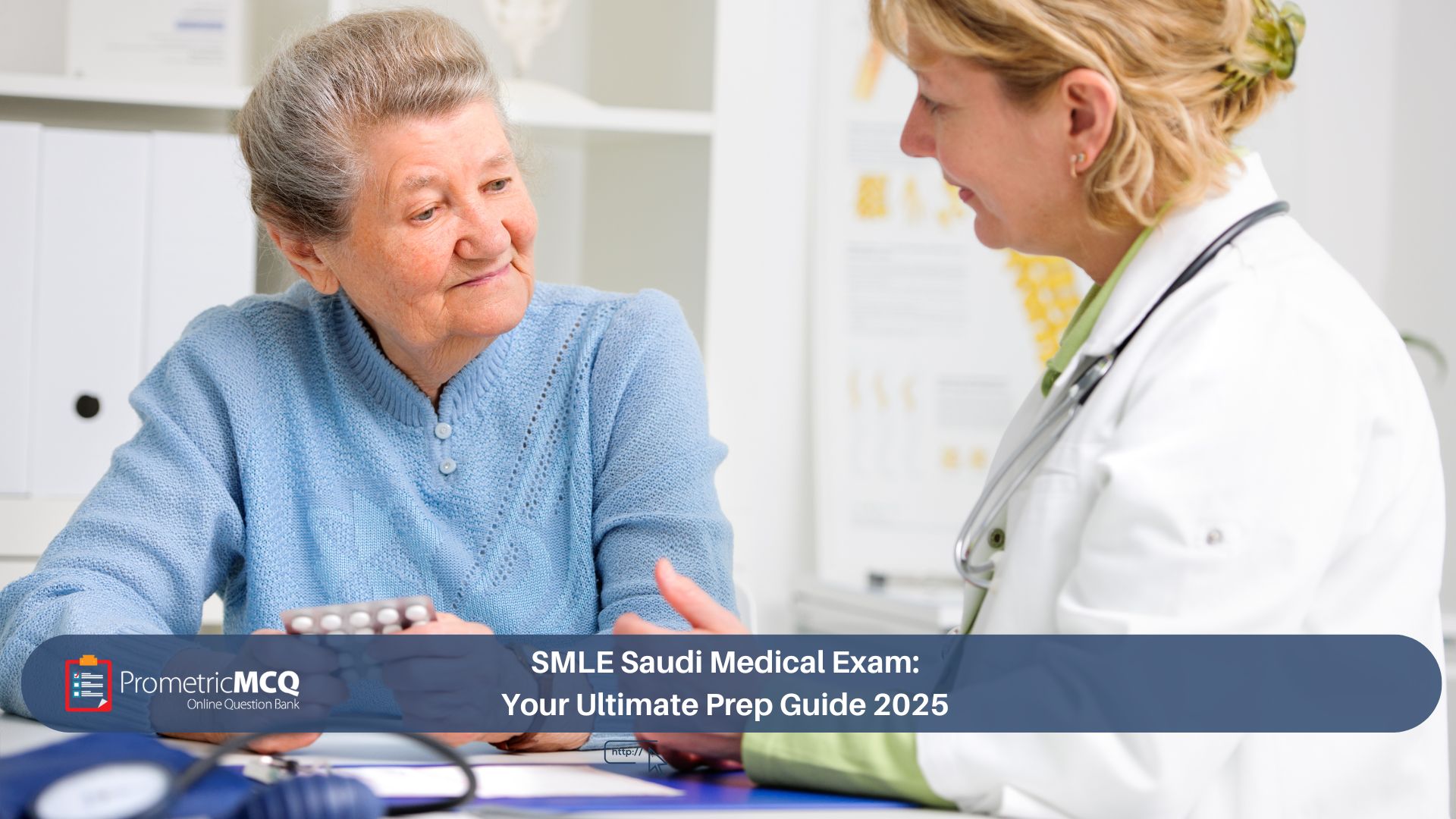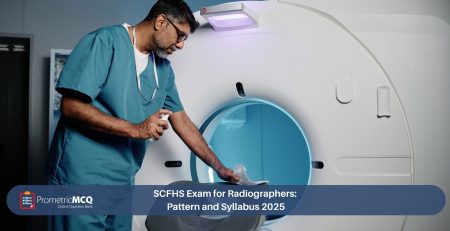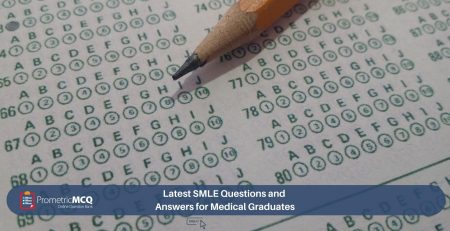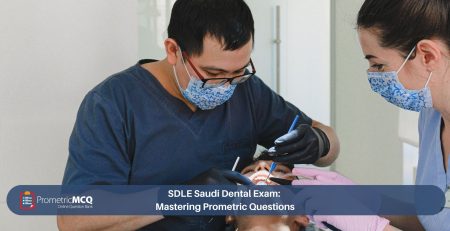
SMLE Saudi Medical Exam: Your Ultimate Prep Guide 2025
fatima@prometricmcq.com2025-09-17T15:35:03+00:00Table of Contents
ToggleSMLE Saudi Medical Exam: Your Ultimate Prep Guide 2025
For medical graduates and practicing physicians worldwide, securing a license to practice in the Kingdom of Saudi Arabia represents a significant professional milestone. The Kingdom’s investment in world-class healthcare infrastructure and its Vision 2030 plan have created unparalleled opportunities. At the heart of this process is the Saudi Medical Licensing Examination (SMLE), a comprehensive and challenging assessment administered by the Saudi Commission for Health Specialties (SCFHS). This exam is the mandatory gateway to clinical practice, designed to ensure that all physicians meet the high standards of competence required. An overview of the SMLE exam provides a great starting point.
The SMLE is more than a test of textbook knowledge. It is a sophisticated, case-based examination that evaluates a physician’s ability to apply clinical knowledge, make accurate diagnoses, and formulate safe and effective management plans. Many highly qualified doctors are surprised by its difficulty, often because they are not prepared for its specific format and the breadth of topics covered. A general medical review is insufficient; success requires a strategic preparation plan that is closely aligned with the official SMLE blueprint and focuses on high-yield clinical scenarios.
This ultimate 2025 prep guide is your definitive roadmap to conquering the SMLE. We will provide a granular breakdown of the exam pattern, a deep dive into the high-yield topics within each major medical discipline, a strategic analysis of MCQ question styles with detailed examples, and a comprehensive 10-point FAQ to address all your concerns. Our objective is to empower you with the knowledge, strategy, and confidence needed to pass the Prometric SMLE and launch your medical career in Saudi Arabia.
Key Takeaways for the SMLE
- Blueprint is Your Guide: The SMLE is based on a detailed competency blueprint. Align your study plan with the official domains and their weightings for maximum efficiency.
- Medicine & Surgery are Core: These two domains constitute the largest part of the exam. A deep understanding of common presentations and emergencies in these fields is critical.
- Think Like a Generalist: The exam is designed to assess the competency of a physician at the level of a general practitioner or a new resident. It tests broad knowledge across all major specialties.
- Ethics & Patient Safety are Key: Expect numerous questions on professionalism, medical ethics, and patient safety principles, which are highly valued in the Saudi healthcare system.
- Practice is Paramount: Success is built on a foundation of extensive practice with high-quality, case-based MCQs that mirror the real exam’s format and difficulty.
Deconstructing the SMLE Exam Pattern
A successful preparation strategy starts with a thorough understanding of the exam’s structure and logistics. Knowing what to expect on exam day is the first step in managing time and anxiety effectively.
- Format: Computer-Based Test (CBT) administered at designated Prometric testing centers globally.
- Number of Questions: The exam consists of 300 Multiple-Choice Questions (MCQs), all in a single-best-answer format.
- Structure: The exam is divided into two sections of 150 questions each.
- Duration: You have 3 hours for each section, totaling 6 hours of examination time, with a scheduled break between the two parts.
- Content Style: The vast majority of questions are clinical vignettes. You will be presented with a patient scenario, including history, physical findings, and/or lab results, and asked to determine the most likely diagnosis, next best step in management, or the underlying pathophysiology.
When faced with a complex SMLE vignette, highlight the key information: the patient’s age and gender, the chief complaint’s duration, and the most significant positive and negative findings. This will help you cut through the noise and focus on the correct diagnosis.
The Official SMLE Blueprint: Focusing Your Preparation
The SCFHS provides a clear blueprint that outlines the approximate percentage of questions from various medical disciplines. Basing your study plan on this blueprint is the most efficient way to allocate your time. A solid SCFHS exam preparation strategy is built on this framework.
| SMLE Content Area | Approximate Weighting | High-Yield Topics for Focus |
|---|---|---|
| Internal Medicine | ~25-35% | Cardiology (IHD, HF, HTN), Endocrinology (Diabetes, Thyroid), Pulmonology (Asthma, COPD), Gastroenterology (PUD, IBD), Infectious Diseases, and Rheumatology. |
| General Surgery | ~20-30% | Acute abdomen (appendicitis, cholecystitis), trauma (ATLS principles), common surgical procedures, pre-operative and post-operative care, and basics of surgical subspecialties (e.g., urology, orthopedics). |
| Pediatrics | ~15-20% | Common infectious diseases, developmental milestones, immunization schedule, congenital abnormalities, and pediatric emergencies (e.g., dehydration, febrile seizures). |
| Obstetrics & Gynecology | ~10-15% | Normal and abnormal pregnancy, labor and delivery, common gynecological issues (AUB, PCOS, STIs), and contraceptive management. |
| Primary Care & Family Medicine | ~5-10% | Preventive medicine, screening guidelines (e.g., for cancer, diabetes), management of common outpatient complaints, and population health. |
| Ethics, Professionalism & Patient Safety | ~5-10% | Informed consent, confidentiality, breaking bad news, medical errors, and quality improvement principles. |
Deep Dive into High-Yield SMLE Topics
Let’s explore the most critical, frequently tested concepts within the major domains.
Domain 1: Internal Medicine – The Core of the Exam
Your performance in this vast domain is crucial for passing the SMLE.
- Cardiology: Be an expert in ECG interpretation for acute coronary syndrome (STEMI vs. NSTEMI). Master the management of hypertension according to the latest guidelines and know the first-line drugs and their major side effects. Understand the diagnosis and management of acute and chronic heart failure.
- Endocrinology: Diabetes Mellitus is a guaranteed topic. Know the diagnostic criteria, oral hypoglycemic agents, insulin therapy, and the management of DKA and HHS. Thyroid disorders (hypo- and hyperthyroidism, thyroid storm) are also very high-yield.
- Infectious Diseases: Focus on community-acquired pneumonia (CURB-65), urinary tract infections, meningitis, and tuberculosis. Understand the principles of antibiotic selection and stewardship.
Domain 2: General Surgery – The Acute Patient
This section tests your ability to recognize and manage common surgical presentations.
- The Acute Abdomen: This is the most important surgical topic. You must be able to differentiate between appendicitis, cholecystitis, pancreatitis, diverticulitis, and bowel obstruction based on clinical presentation and initial imaging.
- Trauma: A solid understanding of the ATLS (Advanced Trauma Life Support) primary and secondary survey is essential. Be prepared for questions on managing shock, tension pneumothorax, and abdominal trauma.
- Pre- and Post-operative Care: Know how to assess a patient’s surgical risk, manage post-operative complications like fever, DVT/PE, and wound infections.
SMLE Sample Questions & In-Depth Rationales
The best way to prepare is to practice with questions that mimic the exam’s style. For extensive practice, using targeted resources like our Saudi Prometric Exam for Doctors QBank is highly recommended.
Question 1: Internal Medicine
A 60-year-old man with a history of hypertension and type 2 diabetes presents to the emergency department with a 2-hour history of crushing central chest pain radiating to his left arm. An ECG shows ST-segment elevation in leads II, III, and aVF. His blood pressure is 90/60 mmHg and his lungs are clear on auscultation. What is the most likely diagnosis?
- Anterior wall myocardial infarction
- Inferior wall myocardial infarction
- Pulmonary embolism
- Aortic dissection
Correct Answer: B
Rationale: This is a classic presentation of an acute ST-elevation myocardial infarction (STEMI). The key to localization is the ECG. ST elevation in leads II, III, and aVF corresponds to the inferior wall of the left ventricle, which is typically supplied by the right coronary artery (RCA). The associated hypotension is common in inferior wall MIs, especially those with right ventricular involvement.
Why other options are incorrect:
A: An anterior wall MI would show ST elevation in the precordial leads (e.g., V1-V4).
C: Pulmonary embolism can cause chest pain but typically presents with dyspnea and tachycardia. The ECG findings are usually non-specific or show signs of right heart strain (like S1Q3T3), not localized ST elevation.
D: Aortic dissection presents with a severe, tearing chest pain radiating to the back and may be associated with a widened mediastinum on chest X-ray, not focal ST elevation.
Frequently Asked Questions (FAQs) for the SMLE
The SCFHS does not publish an official passing percentage. The exam is scored on a scale from 200 to 800, with a passing score set at 500. This is a scaled score, meaning it’s adjusted for exam difficulty. To be safe, candidates should aim to answer at least 65-70% of questions correctly in practice to comfortably exceed the passing threshold.
The clinical content of the SMLE is very similar to the USMLE Step 2 CK or the PLAB Part 1, as it is based on international standards of medical practice. The main difference is the inclusion of questions related to ethics, patient safety, and public health priorities specific to Saudi Arabia. It is also a very long exam (300 questions), testing mental and physical endurance.
For a recent medical graduate, a focused study period of 3-4 months is generally recommended. For a practicing physician, 4-6 months may be necessary to refresh knowledge across all specialties. The key is consistent daily study and extensive MCQ practice.
Primary Source Verification (PSV) by DataFlow is a mandatory verification of your credentials (degree, license, etc.). You must start this process before you can book your exam. It can take several weeks to months, so it is crucial to begin your SCFHS DataFlow process as early as possible.
There is no single “best” resource. A successful strategy combines a primary review source (like UWorld for Step 2 CK or CanadaQBank), a video lecture series for difficult topics, and, most importantly, a high-quality MCQ bank specifically geared towards the SMLE, such as our Saudi Prometric exam study materials.
Candidates are typically allowed four attempts to pass the SMLE. There may be a waiting period or additional requirements after a certain number of attempts. It is essential to check the most current policies on the official SCFHS website.
Yes. While most of the medicine is international, you should be aware of health issues prevalent in the region, such as Middle East Respiratory Syndrome (MERS), thalassemia, and sickle cell disease. Familiarity with national health campaigns (e.g., for diabetes screening or vaccination) can also be beneficial. The policies of the Saudi Ministry of Health are a good reference.
The SMLE has a reputation for being challenging due to its length, breadth of content, and the high standard of competence required. The pass rates are not publicly disclosed but are thought to be moderate. However, with a structured, dedicated preparation plan focused on high-yield topics and extensive MCQ practice, it is a very passable exam.
Results for the SMLE are usually released within 2 to 6 weeks of your test date. You will be notified by email and can view your official score report through your Mumaris Plus account on the SCFHS portal.
After passing the SMLE and having a complete and verified DataFlow report, the next step is “Professional Classification and Registration” with the SCFHS. This officially classifies you as a General Practitioner or specialist. Once registered, you can apply for jobs, and your employer will assist with the final steps to issue your license to practice.
Conclusion: Your Gateway to a Medical Career in Saudi Arabia
The Saudi Medical Licensing Examination is a marathon, not a sprint. It demands endurance, strategic preparation, and a deep understanding of clinical medicine across the board. By using the official blueprint as your guide, focusing your energy on high-yield topics, and committing to a rigorous regimen of MCQ practice, you can conquer this challenge. This exam is your gateway to joining one of the most dynamic and rapidly growing healthcare systems in the world. With the right preparation, you can turn this challenge into a career-defining achievement.
Ready to Begin Your Journey to SMLE Success?
Our comprehensive SMLE question banks are designed to align perfectly with the SCFHS blueprint, featuring thousands of clinical vignettes, detailed rationales, and mock exams to build your knowledge and confidence.










